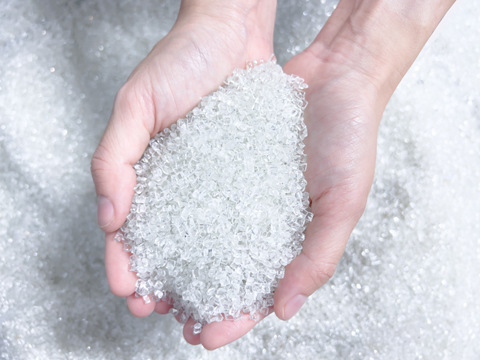
CARBIOS has licensed its PET bio-recycling technology to SASA and approved the construction of an enzymatic depolymerization plant in Adana, Turkey, with an anticipated yearly capacity of 100,000 tons of prepared PET waste sourced from textiles.
According to the European Commission, less than 1% of textile waste is currently recycled back into new textile fibres. Yet upcoming legislation mandates that textiles consist of at least 20% recycled fibres by 2030, driving demand for recycled polyester across the EU.
With Turkey positioned as a major producer, SASA aims to become the largest supplier of high-value-added polyester, both within the region and beyond. Therefore, it plans to incorporate recycling into its operations – utilizing CARBIOS’ PET bio-recycling technology to do so.
Previously uplifted as the best-performing under industrial conditions in scientific journal ACS Catalysis, CARBIOS’ enzymatic depolymerization technology recycled PET and textile waste in a solvent-free process. It is said to result in ‘virgin-like’ products,
Having signed a Letter of Intent, the companies now aim to meet increasing global demand for sustainability-minded textiles, placing a particular emphasis on the European market, and process PET waste that is not yet recyclable using conventional recycling technologies. SASA is set to produce polyester pellets, fibres, and textiles from a range of waste sources, including polyester waste, and diversify its range of offerings.
On a wider scale, CARBIOS intends to become a leading technology provider in PET recycling by 2035. Meanwhile, SASA’s ongoing transformation strategy includes back integration, capacity extension, an increase in competitiveness, and circularity.
“With the creation of a major PET yarn and fibre manufacturing capacity on a European scale, we believe Turkey will play a pivotal role in the expanding textile market,” said CARBIOS CEO Emmanuel Ladent. “Partnering with SASA, a leader in polyester production, is a natural fit for CARBIOS’ international ambitions for licensing our biorecycling technology, and will contribute to a more circular and sustainable textile industry.”
“As a leading producer of polyester, it’s our duty to pave the way in terms of sustainability and environmental responsibility,” added Dr. M. Kemal Öz, general manager at SASA. “SASA needs to be a part of the recycling business and our partnership with CARBIOS reinforces our commitment to innovation to advance a circular economy for textiles.”
Another joint Letter of Intent has been signed between CARBIOS and Zhink Group. The resultant enzymatic depolymerization plant in China is expected to produce 50,000 tons of prepared PET waste every year and drive the usage of enzymatically recycled rPET throughout Asia.
Furthermore, CARBIOS is currently building an industrial-scale enzymatic PET recycling plant in Longlaville, France, which held its groundbreaking ceremony back in April. In a recent Memorandum of Understanding, Nouvelles Fibres Textiles agreed to supply the new facility with polyester textiles and aims to redirect 5,000 tonnes of textile waste towards bio-recycling every year from 2026 onwards.
If you liked this story, you might also enjoy:
How are the top brands progressing on packaging sustainability?
Sustainable Innovation Report 2024: Current trends and future priorities
Reuse vs. single use – which is better for the environment?
The ultimate guide to global plastic sustainability regulation














No comments yet